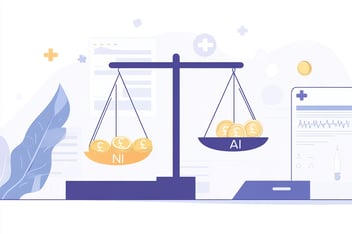
What Patients Want From their GP's: our Thoughts on the BJGP article

A recent article by Professor Helen Atherton, What do patients want from access to UK general practice, sheds light on the persistent misalignment between what patients hope for and what general practice systems currently deliver.
Her findings point clearly to the core needs patients have when accessing care: timely booking, genuine choice in how and with whom they consult, consistency in communication, and continuity of care. At the same time, her work indirectly highlights the increasingly complex and unsustainable role placed upon reception teams—now expected to juggle digital tools, triage protocols, and emotional labour without proportionate support or training.
Reclaiming Time, and Energy, for reception teams
While much of the conversation around digital access focuses on patients, Atherton’s research and related studies show that receptionists are often the unsung linchpins of primary care. They are asked to manage a complex and evolving landscape of demand, often without the time, training, or digital confidence to do so effectively. Reception fatigue and burnout are becoming ever more prevalent, not due to unwillingness, but due to systemic overload.
EMMA offers a way forward. By automating the high-frequency, low-complexity tasks - such as booking appointments, processing prescription requests, handling test result queries, or chasing follow-ups, EMMA frees reception teams to focus on the human aspects of care: listening with empathy, handling edge cases, or supporting vulnerable patients in distress.
Moreover, EMMA delivers consistency. Every patient receives the same clear instructions, the same triage criteria, and the same escalation logic—removing the day-to-day risk of miscommunication between staff or inconsistency across practices. This not only improves the patient experience but also strengthens quality assurance at the PCN and ICB levels.

Value Beyond the Front Desk
Atherton’s review also highlights a growing concern about health inequalities. The push toward digital-first models risks leaving behind those without the means, confidence, or ability to engage online. EMMA’s design actively accounts for this, providing an automated option without forcing patients to adjust to a new way of booking appointments.
She also offers a level of resilience that’s difficult to achieve otherwise. During times of staff illness, turnover, or seasonal pressure, EMMA doesn’t need retraining or rest—it simply continues to deliver consistent, safe access on behalf of the team.
The Right Tool for the Right Time
Helen Atherton’s article “What do patients want from access to UK general practice” articulates a now-familiar dilemma for general practice: patients are increasingly dissatisfied with access, while staff are increasingly overstretched. These aren’t two separate problems—they’re different sides of the same coin.
EMMA is not a sticking plaster or a novelty. It is a carefully engineered response to the structural access challenges general practice faces in 2025. It allows surgeries to be more responsive, more inclusive, and more sustainable, without burning out their teams.
Whether you’re a single surgery looking to ease daily pressures, a PCN trying to unify your access model, or an ICB tasked with system-wide transformation, EMMA offers a pathway to deliver what patients want and what staff desperately need: clarity, capacity, and care.
Related content


Why Clinical Input Matters in AI GP Reception—And Why Many Providers Lack It
